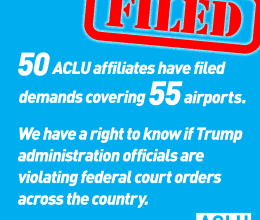
The ACLU of Alaska filed a lawsuit against the Kenai Peninsula Borough on behalf of two Kenai residents who are unconstitutionally barred from giving an invocation before the KPB Assembly due to the Assembly's new invocations policy.
Two Kenai Residents Sue Borough over Its Unconstitutional Invocation Policy
Policy Discriminatorily Limits Who May Give Invocations
FOR IMMEDIATE RELEASE: December 14, 2016
CONTACT: Joshua A. Decker, ACLU of Alaska, 907.263.2002
ANCHORAGE, ALASKA – Today, the American Civil Liberties Union of Alaska filed a lawsuit against the Kenai Peninsula Borough on behalf of Lance Hunt and Iris Fontana, two Borough residents who are standing up to challenge the Borough Assembly’s unconstitutional restrictions on who may offer invocations at the beginning of the Assembly’s public meetings.
Lance Hunt and Iris Fontana each gave separate invocations this summer, during a period when the Assembly allowed invocations on a first-come, first-served basis. Lance, an atheist, invoked the Assembly members’ common humanity to solemnize its July 26 meeting: he encouraged the Assembly members to overlook differences and to have empathy for one’s neighbors. Iris, who read an invocation from The Satanic Temple to solemnize the Assembly’s August 9 meeting, encouraged the Assembly members to use innate, human reason to guide their deliberations. In a direct response to Lance and Iris’s invocations—and to prevent them and other community members from giving similar invocations in the future—the Assembly adopted unconstitutional and discriminatory restrictions that limit who may publicly solemnize Assembly meetings. The restrictions limit that honor to members of religious associations that are established in and regularly meet in the Kenai Peninsula Borough.
“I’ve lived on the Kenai since 1994,” said Plaintiff Lance Hunt. “I’m involved in my community and I try to make the Kenai a better place for my neighbors. My July invocation called on the members of the Borough Assembly to be good to everyone, to recognize our common humanity, and to have empathy for our neighbors. Just because I don’t belong to a religious association, I don’t understand why the Assembly felt the need to prevent me from offering a similar invocation in the future.”
“I grew up in Ketchikan and moved to the Kenai six years ago and plan to stay for the rest of my life,” said Plaintiff Iris Fontana. “As a psychology and anthropology major at the Kenai Peninsula College, I’m learning how to help people. As I study the world’s cultures and societies, I’m struck by how alike we all are. In August, I tried to inspire the Assembly members to use our common, innate human gifts of logic and reason as they deliberate on what’s best for me and my neighbors; last month, they told me that I could not give another invocation.”
In the seminal 2014 U.S. Supreme Court decision on invocations, Town of Greece, N.Y. v. Galloway, Justice Samuel Alito noted that since the start of the First Continental Congress in September 1774—before the United States had even declared its independence—“one of [the] purposes, and presumably one of [the] effects” of invocations “was not to divide, but to unite.” Justice Kennedy explained that once the government “invites prayer into the public sphere, government must permit a prayer giver to address his or her own God or gods as conscience dictates, unfettered by what an administrator or judge considers to be nonsectarian.”
“This is why we sued today,” said Eric Glatt, staff attorney at the ACLU of Alaska. “Rather than picking invocation speakers in a fair and neutral manner, such as first-come, first-served, the Borough has decreed that some speakers are acceptable and others—like our clients Lance and Iris—are not. This violates the Constitution’s guarantees of equal protection, freedom of speech, freedom of association, and not favoring one religious practice over another.”
This lawsuit comes after the ACLU of Alaska spent two months asking and encouraging the Borough to abandon its unconstitutional restrictions. “We sent two letters, we traveled to three Assembly meetings, and we clearly explained that the Borough could not have this policy to exclude people like our clients, Lance and Iris, from offering invocations,” said Joshua A. Decker, executive director of the ACLU of Alaska. “But, in spite of Borough Mayor Navarre’s veto, the Assembly overrode it and doubled-down on this unconstitutional discrimination. Even though the Borough refused to do the right thing, it’s the job of the ACLU to protect the Bill of Rights, which is why, to protect the constitutional rights of Lance, Iris, and everyone else, we had to sue today.”
The American Civil Liberties Union is our nation’s guardian of liberty. For nearly 100 years, the ACLU has been at the forefront of virtually every major battle for civil liberties and equal justice in this country. Principled and nonpartisan, the ACLU works in the courts, legislatures, and communities to preserve and expand the individual rights and liberties guaranteed to all people in this country by the Constitution and laws of the United States. The ACLU of Alaska, founded in 1971, is one of the 53 state ACLU affiliates that strive to make the Bill of Rights real for everyone and to uphold the promise of the Constitution—because freedom can’t protect itself.
This release is at: acluak.org/en/news/aclu-files-lawsuit-against-kenai-assembly-protect-religious-liberty
###


